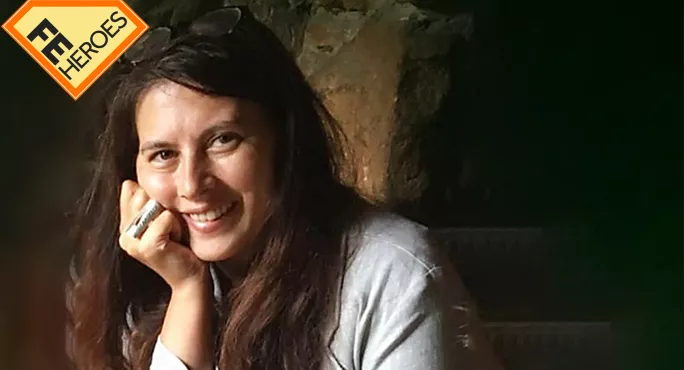
FE Heroes: ‘It is definitely where the magic happens’

What is your name, job title and place of work?
Liz Barrett, principal. I work for ATTFE College, which is based in North Nottinghamshire and part of a multi-academy trust [Academy Transformation Trust].
How long have you held your current role, and what other jobs did you have before?
I have been principal since November 2016. I started out as a sessional tutor, then became a curriculum leader, then deputy of adult and community learning, followed by acting head of adult education and then principal.
Teacher burnout: Three ways to avoid it this term
FE Heroes: ‘Covid recovery is a major challenge for FE’
Background: The number of colleges taking on 14-16 students falls for the first time
How - and why - did you first start working in further education?
My further education work started as a favour to a dear friend who was teaching at the local college and had just been diagnosed with having terminal cancer. She didn’t want to let the college down by not being able to teach her classes, and asked me to step in. It was a baptism of fire but it felt a very important step to take to help support my friend in her remaining few weeks of life.
Briefly describe what a day at work looks like for you...
I start my working day around 5.30am by doing admin whilst listening to the dawn chorus and watching the outside world get lighter. Once in work, I travel between our main two campus sites and spend time in each of them each day if time/commitments allow. My favourite part of any day is visiting classes to chat with learners and their tutors. I love seeing the learning that is taking place, the curiosity from learners, what learners are achieving along with sharing their achievement celebrations with them. A typical day is peppered with a wide range of different meetings from strategic, operation and stakeholder. ATTFE College is heavily involved in partnership work within the communities that we serve and I very much enjoy exploring new and innovative ways to embed lifelong learning opportunities further. My working days often carry on until late into the evening, where, as a volunteer, I attend a range of different partnership meetings from being a trustee at the local observatory to a primary school governor. During the pandemic year, I have also worked as a volunteer for an emergency food parcel delivery service. Despite being one year into the pandemic, the need for emergency food is increasing rather than decreasing.
What motivates you in your workplace?
I am passionate about the opportunities that lifelong learning presents. It truly has the ability to change individual adult lives and family units. It supports local regeneration, raises aspirations and can inspire the younger generation. Further education is definitely where the magic happens!
Share an anecdote about a student or learner who has inspired you...
When I first started teaching I had a learner who was in her early twenties who was an elective mute with no confidence. This learner has had a history of “on-off” learning at the college for the past 20 years. Presenting her with a “star learner trophy” in December 2020 was a real highlight for me, not least because in her presentation speech she talked and talked and talked. As a college, we have continued to support this learner during this past Covid-19 year and she has just created a video for us as to the impact of this work. It was humbling to watch and typifies the powerfully positive impact that lifelong learning can bring to a person’s life.
Do you enjoy working in FE? And if so, why?
I passionately love it! On a personal level, I love to learn new skills and knowledge. I know from first-hand experience how lifelong learning can change your life and am keen to ensure that as many people as possible are exposed to further education opportunities so that they too can benefit.
What do you see as the big challenges for the FE sector in the next few years?
FE funding is always a cause of uncertainty, which, by its very nature, creates a vulnerable staffing situation. I therefore feel it is vital that, as a sector, we ensure that the work that FE does and its impact is fully recognised and funded accordingly on a stable and permanent footing just like schools are.
What do you think our FE sector will look like in 30 years’ time?
I see fabulous work in the FE sector on a day-to-day basis that is vibrant, committed, exciting and innovative. I would like to think that the FE sector will continue to be all of these things and more.
If you were made apprenticeships and skills minister, what is the first thing you’d introduce or change?
I would instantly change the funding landscape of FE to ensure that the sector is given security which would then attract further staffing talent.
You need a Tes subscription to read this article
Subscribe now to read this article and get other subscriber-only content:
- Unlimited access to all Tes magazine content
- Exclusive subscriber-only stories
- Award-winning email newsletters
- Unlimited access to all Tes magazine content
- Exclusive subscriber-only stories
- Award-winning email newsletters
You need a subscription to read this article
Subscribe now to read this article and get other subscriber-only content, including:
- Unlimited access to all Tes magazine content
- Exclusive subscriber-only stories
- Award-winning email newsletters
- Unlimited access to all Tes magazine content
- Exclusive subscriber-only stories
- Award-winning email newsletters